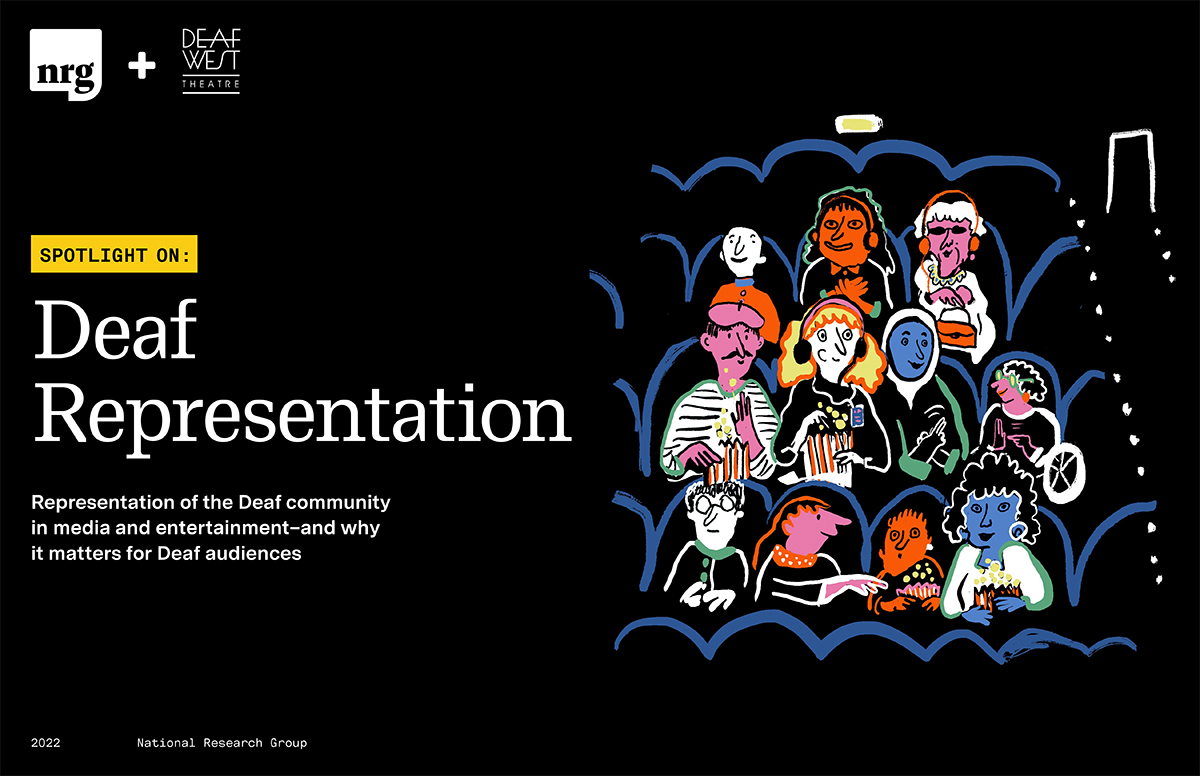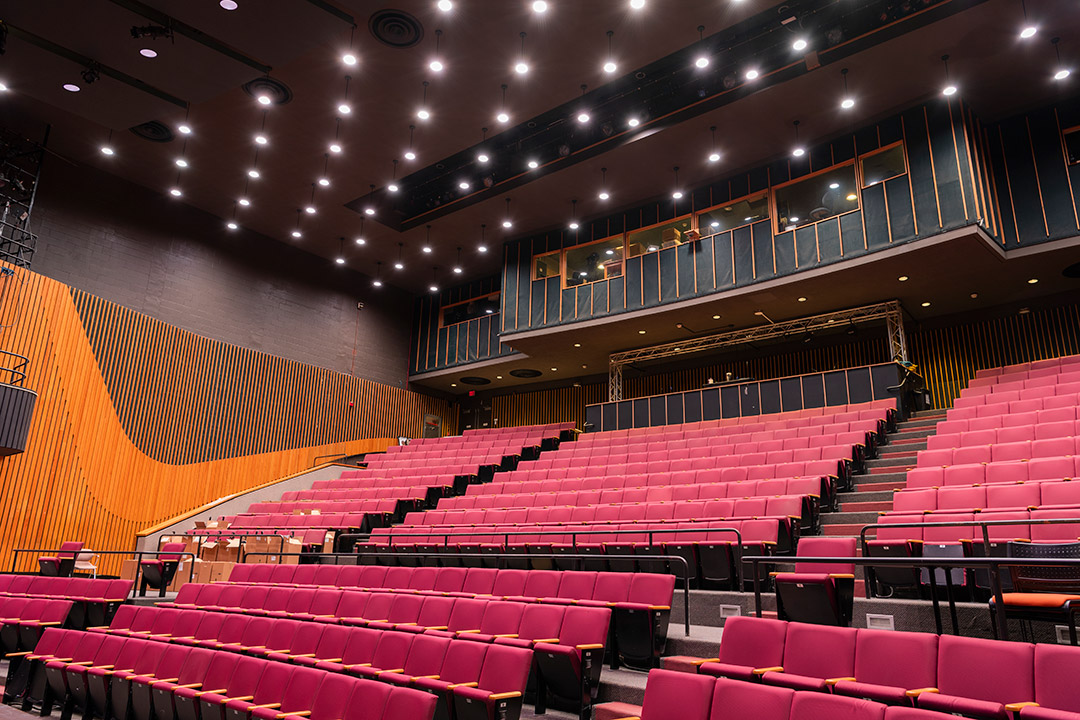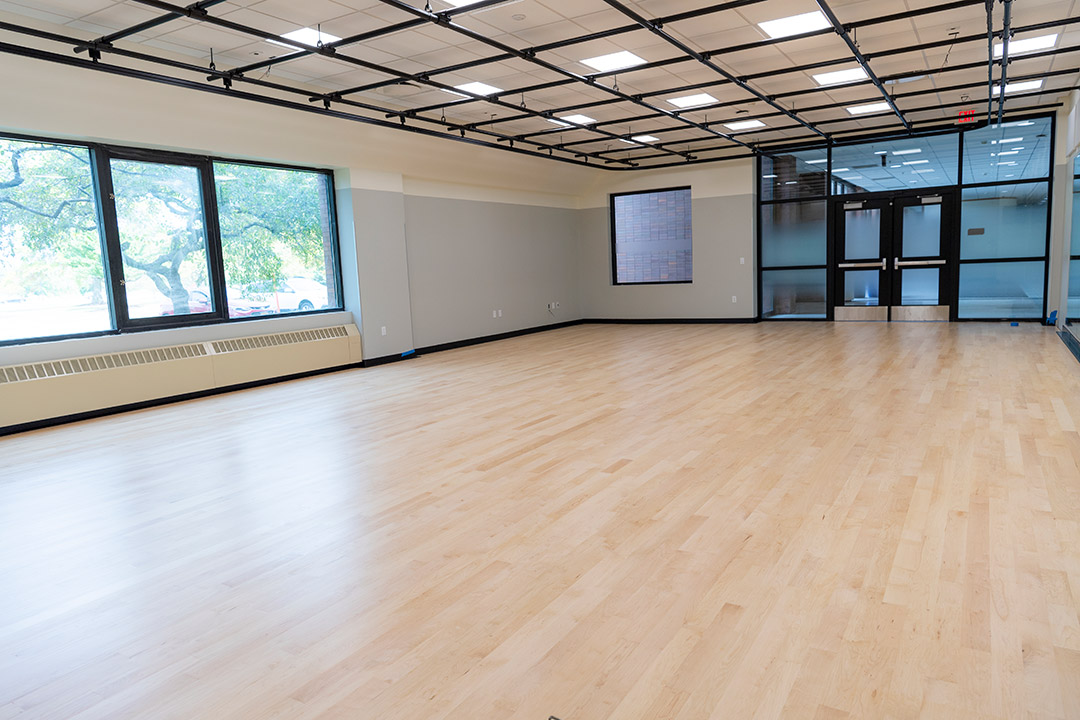Department of Performing Arts
Overview
The NTID Department of Performing Arts produces several shows per season. Faculty and staff collaborate extensively with the College of Liberal Arts’ School of Performing Arts, while also maintaining NTID’s long tradition of Deaf-centered theatre and dance. All of our productions are accessible to Deaf, hard of hearing, and hearing audiences, whether back stage, onstage, or in the house. We are also committed to offering accessible performances for audiences with visual and other disabilities.
The NTID Department of Performing Arts offers an array of courses in dance, Deaf performance, and technical theatre taught by our accomplished faculty and staff. The department offers a Minor and Immersion in Theatre Design and Stagecraft; a Minor and Immersion in Dance; and a Minor in ASL Performance for bachelor level students.
Our Mission and Values
The NTID Department of Performing Arts immerses students in a creative environment where they can explore the intersections of the performing arts, technology, and deafness. Benefits from studying and participating in the performing arts include:
- Fostering an appreciation of diverse art forms
- Developing creativity and self-expression
- Strengthening visual perspectives and sign language competencies
- Developing interpersonal, artistic and expressionistic skills that can be used in many other aspects of life
We recognize each individual's background and experiences provide unique perspectives as we represent the world around us through the arts. We believe the performing arts should provide the foundational environment to embrace and reflect this diversity on stage, backstage and through the lens of the audience. Our work is guided by these principles:
- Choose season programming that presents a range of voices and creates opportunities for diverse, inclusive casting.
- Select directors and production leaders from a wide range of backgrounds.
- Embrace diverse, inclusive casting for every role, while honoring a playwright’s expressed intentions and adherence to licensing agreements.
- Provide opportunities for students to grow as artists, rather than being solely defined by their ethnicity, race, gender, sexual orientation, age, hearing status, disability, or other identifying characteristic.
- Actively engage with RIT, local, and national communities to recruit performers and production team members from diverse backgrounds.
- Maintain and advance the long history and legacy of deaf-centered performance at NTID.
- Regularly offer visual description, relaxed performances, and other accommodations to make our productions accessible to people with disabilities.
- Experiment with new modes of performance that create new possibilities for artistic expression and inclusion.
- Eliminate barriers that prevent people with disabilities from participating in design and production activities.
- Recognize and work to dismantle systematic barriers to access and inclusion within the college and institute.
- Ensure our teaching materials and practices are accessible, inclusive, and equitable.
- Seek out opportunities to continue our individual journeys in creating an intersectional, inclusive, and culturally-respectful department environment.
Our History
Performing Arts at RIT originated with NTID. After the success of the student drama club founded by Dr. Robert Panara in 1969, drama became an integral part of NTID’s curriculum. The Experimental Educational Theatre Program opened in 1974 and eventually became the Department of Performing Arts. Until the College of Liberal Arts opened in 1997, we were the only college on campus offering theater, dance, and even music classes. Deaf theatre faculty over the years have included Patrick Graybill, Phyllis Frelich, Susan Jackson, Aaron Kelstone, Shanny Mow, and Howie Seago. Performance group Sunshine Too was part of the department from 1980-1989, touring nationally and internationally to present programs about Deaf awareness, social issues and the environment. The company was relaunched in 2017 as Sunshine 2.0. Dance was added to the curriculum in the 1980s, under the leadership of Michael Thomas. The RIT/NTID Dance Company, a unique ensemble of deaf, hard-of-hearing, and hearing students, presented a diverse repertoire of student and faculty choreography from 1980-2010. In 2021, the dance company was relaunched as Dance Core under the direction of faculty Marc Holland.
RIT and NTID Performing Arts present
The Cracked Nut
April 4-6, 2025
Performances are scheduled for 7:30 p.m. on April 4-5 and 2 p.m. on April 5-6
Robert F. Panara Theatre
Choreographed by: Marc Ellis Holland and Julia Nguyen
Jazz Ensemble led by: Kyle Vock
A reimagined rendition of The Nutcracker, The Cracked Nut is set in 1940s Harlem. In this innovative adaptation, traditional gender roles are transcended and a culturally diverse mix of dance genres takes center stage, all set to the music of Duke Ellington’s Three Suites and Tchaikovsky's Snow. By blending various dance styles, it aims to break down barriers and provide a platform for students of all abilities to partake in the experience of participating in a full-length, original production.
Tickets for the productions go on sale at 10 a.m. Monday, Sept. 9. Tickets are $5 for students, senior citizens, and children under age 12; $10 for RIT faculty/staff/alumni; and $12 for the public and can be purchased online, by phone at 585-475-4121, or on campus at Gene Polisseni Center Box Office, 200 Lomb Memorial Drive, Rochester N.Y. 14623. Tickets may also be purchased at the venue on performance days two hours before the shows begins.
Productions and Auditions
Productions
Every aspect of an NTID production is accessible to Deaf, hard-of-hearing, and hearing people: back stage, onstage, or in the house. We also offer an audio described performance for each theatre production. To request other accommodations, please contact ntidperformingarts@rit.edu.
Auditions
RIT and NTID Performing Arts are excited to announce auditions for the following productions:
Concord Floral
Peter and the Starcatcher
Freshwater
Peer Gynt
The Cracked Nut
Full production descriptions, advisories, character descriptions, audition/rehearsal dates, and tech information can be found in the Fall 2024 Audition Notice (pdf) and on this webpage.
Facilities & Theatre
A Unique Form of Theatre
In developing a production that is equally accessible to Deaf and hearing, on-stage, backstage, and for members of the audience, there are many factors to consider that are unique to this form of theater: designing costumes and sets that are historically accurate yet provide sightlines and clear background for the Sign Language to play against (it's difficult to read Sign Language from the audience if the actor has on a bright, paisley shirt or the set is a series of "busy" colors and lines); or how to represent off-stage dialog and/or sound effects visually; keeping focus on the actors and not on extraneous, but often necessary movement; how to interpret dialog from the script that is based on sounds such as imitation of another's voice; how to stage or "block" the show so that both the audience and the actors can see each other at all times; how to cue an actor that cannot see the action on stage, but must enter on a certain line; how to incorporate voice actors; and many, many other unique things that make this type of theater so exciting. Design and staging challenges, script translation to Sign Language, and non-traditional casting are examples of the factors that cause our Director's imaginations to soar--much to the benefit of our audiences.
From the experimentation and imagination required to mount one of our productions, we have developed a body of works that have enriched the lives of hundreds of thousands audience members and a working process that has greatly benefitted and encouraged hundreds of young Deaf performers. We are very proud of the fact that many of the Deaf Professionals in the performing arts and entertainment industry are our former students, faculty and staff.
Our very successful heritage is now the backbone for our future growth. We are looking to expand our academic programs as well as our relationships with mainstream professional and community theaters. We produced the first-ever "American Deaf Play Creators Festival" and look forward to its continued growth and development. We look forward to the future, having the confidence and desire to promote artistic growth within the Deaf community and awareness of the many talents of Deaf Artists within the hearing community.
Buy-A-Seat Program
Make a gift to Buy-A-Seat in the Robert F. Panara Theatre! This gift will make you a permanent supporter of the exciting performing arts program at NTID and a participant in some exciting renovations. We will mount a brass plaque with the inscription of your choice on your seat in the newly renovated theatre. It will be a permanent symbol of your generosity for thousands of theater goers to view each year. And, you will be helping to support the first major renovations to the Robert F. Panara Theatre in its thirty-year history.
Latest Performing Arts News & Articles
 In February 2022, CODA made history by becoming the first movie featuring a predominantly Deaf cast to win the Academy Award for Best Picture. And Troy Kotsur, one of the film’s stars, became only the second Deaf performer to be nominated for (and win) an Oscar. At the time, this moment was heralded as a landmark in the fight for greater representation for the Deaf community.
In February 2022, CODA made history by becoming the first movie featuring a predominantly Deaf cast to win the Academy Award for Best Picture. And Troy Kotsur, one of the film’s stars, became only the second Deaf performer to be nominated for (and win) an Oscar. At the time, this moment was heralded as a landmark in the fight for greater representation for the Deaf community.
Read the full report (PDF).






























